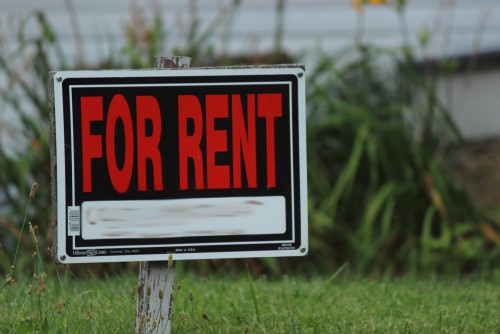
When students came before the council last month to support Sterling Apartments, chief among their concerns was the lack of housing vacancy embodied by the 0.2 percent vacancy rate. However, As Don Gibson, representing the Graduate Student Association, noted, the “next number” – 13 percent – was also a concern.
“Thirteen percent was the approximate increase in rent from this time last year because landlords have all of the power in the city of Davis,” he said.
For Sara Williams, a fourth-year student at UC Davis and Chair of the ASUCD External Affairs commission, she said she works four jobs in order to pay her rent.
Emily Goo points out, “I’m part of a very vulnerable demographic in the city of Davis, it is easy for people to exploit students as we come into this housing climate, as there is not enough housing and many students of my age do not know how to deal with housing.”
Daniel Nagey, an ASUCD Senator, said, “Renters (landlords he meant) can capitalize on the fact that there aren’t a lot of housing spaces – so they can charge double or triple the amount that they should be charging.” He argued this would reduce that “tension” and work toward “affordable housing in Davis which is a really big need.”
So far the discussion has focused on a debate over whether the university or city needs to provide the housing. Obviously a key component to de facto rent control would be to increase the available rental units and beds.
Right now a 0.2 percent vacancy effectively means that landlords can charge a lot more than many students can afford. This leads to many students doubling and tripling up in rooms to reduce costs, a number of students working multiple jobs, and the other accompanying problems.
Council has passed a rental ordinance with a mind toward an inspection program. As city staff reported in January, Davis was lacking a rental ordinance. As a result, as staff notes, “some residential rental units in Davis are substandard, overcrowded, and/or non-compliant with State and local laws. These substandard conditions can render the rental housing unit unfit or unsafe for human occupancy.”
Beginning in 2014, Councilmember Brett Lee requested staff review rental property resources offered by the city and develop a plan to address renter and property management issues.
While that is a start, it does not get to the issue of cost of rent or rent control.
There are currently some limits on rent control – though that may change.
In the midst of their own skyrocketing rental crisis, San Francisco Assemblymember David Chiu is proposing AB 1506 that would repeal the Costa-Hawkins rental Housing Act, enacted in 1995 which exempts a California rental property from rent control if “it has a certificate of occupancy issued after February 1, 1995.”
Proponents of AB 1506 believe it would go far in strengthening rent control and limiting rental increases by allowing the cities to once again regulate rental rates on new houses.
Assembly Member Rob Bonta of Oakland also supports the new law. He wrote, “Our office is working to gather support for this bill and naturally we wanted to reach out to see if this is an issue your organization can consider supporting.
“The bill is pretty straightforward as it repeals the Costa-Hawkins law. A strategic communications and advocacy plan is in the works. However, we are asking all of our local advocates and their partners to help by sending in letters of support, making phone calls, writing op-eds, setting up meetings with key Assemblymembers and mobilize constituents in support of AB 1506. This will be a heavy lift and we need all hands on deck!
“Currently the bill has gone through its first reading (introduced 2/17/17) and we expect it to be assigned to the Housing and Community Development Committee within the next couple of weeks. We will keep you informed of when it reaches the committee. There are seven members, and we need a majority to pass. I have highlighted in bold the members whose votes are critical in order to get the bill passed out of committee. If you have allies in these districts please communicate with them and ask them to support AB 1506.”
Those are the legal hurdles that rent control would face.
A key question is what is the best approach here. For a long time, the discussion has focused on pressing the university to build more housing. That is clearly needed.
However, right now the university has dug in its heels on building for 90 percent of new students. That leaves about a 4000 bed gap between the campus supplying 40 percent of the overall housing and the 50 percent that the city supports.
Greg Rowe in a comment yesterday argued that “housing 100% of new enrollees and 50% of total enrollment in 2027 should be a minimum goal. Given the tremendous growth projected by UCD, going far beyond 50% would be preferable. And, UCD administrators have publicly hinted at the November Board of Regents meeting that 39,000 could in fact be exceeded, when it was said that 2027 enrollment will be something ‘just under 40,000.’”
Clearly, reducing the 0.2 percent vacancy rate would reduce the pressures to increase rent, but student groups are starting to look at the secondary need for rent control itself.
What that would look like and whether AB 1506 will pass remains to be seen.
—David M. Greenwald reporting







Rent control is a poor attempt at a solution to the housing problem. It sounds great at first blush unless you’re a landlord, but in the end it further distorts the market without solving the underlying problem. Landlords game the system by reducing maintenance and finding excuses to evict tenants in order to gain the new-lease bump; tenants game the system by illegally subletting to avoid the new-lease bump; and the city is forever in catch-up mode trying to enforce the intent of the ordinance.
I have a cousin who’s lived in the same apartment in San Francisco for 20+ years. The place is literally falling apart (a portion of the living room ceiling fell in years ago, and there are numerous leaks), but the landlord won’t fix it. My cousin doesn’t complain to the landlord anymore because it doesn’t do any good, but he doesn’t move out because his rent is so ridiculously low in a city with a notoriously bad rental market.
I’m open to the conversation, but I’m going to have to be convinced that rent control is a good idea for Davis.
I vote with Jim, due to very similar experiences/reasons… we should not “go there”… if we do, there are likely ‘unintended consequences’ that could be disastrous.
I was a student in Berkeley when rent control was enacted. The immediate impact was that all the apartments that had been double occupancy per room were changed to single occupancy, effectively cutting the number of available beds in half. Landlords decided that if they could not recover their costs through rent increases that they needed to reduce the wear and tear on the properties by cutting the number of tenants. The longer term impact is as Jim describes above, permanent residents in apartments (leading to even fewer beds for students) and buildings in decay. I don’t need to be convinced, rent control in Davis is a bad idea.
Mark’s comment illuminates an important question that would need to be addressed in any contemplated ordinance . . . specifically, is the rent controlled at the per-unit level, the per-bedroom level, or the per-occupant level?
And … would it apply to rentals of SF houses?
The two markets are different… SF rentals usually involves an owner of 1-5 properties… skewed to 1-2… MF rentals in Davis are largely owned controlled by a small handful of owners… Tandem comes to mind.
Before we sold the house we rented out, we raised rent ~ 0-2%/year, but made sure utility bills were covered. That’s over a 22 year period…
The year over year rent increase was indeed very high and is a problem, but it also must be put in context. This is not just a Davis problem, this is a regional problem. Sacramento lead the nation in rent increases. at about 11% more than 2 years running
2017: Sacramento Is The #1 City For Rent Increases In The Nation! See Why
http://now100fm.cbslocal.com/2017/02/03/sacramento-is-the-1-city-for-rent-increases-in-the-nation-see-why/
2016: Sacramento again tops most cities in apartment rent increases
Sacramento http://www.bizjournals.com/sacramento/news/2016/01/28/sacramento-again-tops-most-cities-in-rent-increase.html
2015: Rents gone wild: Sacramento is one of the hottest rental markets in the country
https://www.newsreview.com/sacramento/rents-gone-wild-sacramento-is/content?oid=19356923
Here is one description of the rent control law in San Francisco. There are actually lots of ways to increase rents to pay for improvements.
As a homeowner without tenants, I’d be happy to have my taxes and other fees increase at least 13% annually – or even 20% would be okay – to order to show solidarity with other owners and prevent a disaster.
I take it you’re being sarcastic here.
I don’t read it as sarcasm.
It was just so over the top I figured it had to be sarcasm.
100% sarcasm.
Rent control has been shown to be an ineffective policy. This is particularly true with vacancy decontrol (rents are allowed to rise with new tenants). And since this is intended to help students, decontrol required under state law will make this completely ineffective as they have high turnover.
Studies show rent controlled units have lower maintenance and lead to neighborhood blight.
A study of Cambridge rent control found that the benefits flowed to middle and upper class tenants who outcompeted low-income tenants.
People keep searching for the “magic bullet” that will avoid the one solution that will work–approving more housing in the City.
For more on this see:
http://www.urban.org/urban-wire/rent-control-good-policy
http://www.nber.org/digest/oct12/w18125.html
Exactly
Richard: I disagree with you on the magic bullet point. The people who are pushing for rent control – students primarily – are not the people opposed to housing. In fact talking to them yesterday, they saw this as one piece of a larger puzzle.
Rent control is just one of many approaches that people hope will be the ‘silver bullet’ to address the housing shortage. In Davis, the current preferred method is to get the University to build the housing (David’s silver bullet). All of those efforts will ultimately fail, however as Richard has correctly identified the only solution that will work, build more housing in town.
Some students occupied Mrak Hall over UCD’s investments in fossil companies. They occupied Mrak Hall to get rid of Katehi. They protested Milo to stop his free speech. They have no aversion to protesting or advocating for causes they believe in. If housing is such a concern why waren’t they using the same tactics against UCD to force them to build? All we’ve seen is students coming out against the proposed housing on the Russell fields. They need to step up their game.
They didnt occupy MRAK over fossil fuel…
To your main point – I’ve actually wondered that myself.
Keith, my guess (and it is only a guess) is that rent levels is a very individual issue . . . one where you are experiencing (or have experienced) rental housing challenges. If the issue isn’t “touching” you then self interest puts it into the out of sight. out of mind category. Said another way, it is a personal-level need rather than a societal-level cause.
The other aspect is the uncertainty of alliances. With societal-level causes it is easy to identify the people who share similar views about the cause, and the views are unlikely to experience sudden change. On the other hand, the alliances surrounding housing are much more susceptible to change. If a person suddenly loses their housing, they are much more likely to have a similarly sudden change of perspective on the housing issue. If a person who is housing-challenged suddenly finds a solution to their personal housing crisis, they are much more likely to have a similarly sudden reduction of interest in the housing issue.
There are a significant number of students who are volunteering time on advisory committees and work groups focused on student housing. Some of these students attended the Council Meeting on Sterling. Maybe they see this advocacy work as more effective than a protest at Mrak Hall.
Huh? The students are pushing for rent control? Seems to me they just handed Rancho Yolo & the LRDP-jihadis one last weapon to kill off the Sterling project (apart from the inevitable CEQA lawsuit). Apparently, these students aren’t econ majors.
Sharla,
More student advocacy for more on-campus housing would be very helpful to getting solutions for the need for more student housing as well. A protest at Mrak for more student housing would be a good example of how to do that.
Now there’s a student protest even I could support.
The basic problem is that there is too little available housing and building new housing has been made extremely difficult and costly. Students who are concerned about the lack of housing and the high cost of what is available, should be working to get more housing built.
Let’s look at this as would a student of very basic biology:
1 – Get petri dish
2 – Fill it with the right amount of growth medium
3 – Add people
Alternative:
1 – add people (that’s sort of a ‘given’)
2 – get rid of the agar/growth medium… or poison it
3 – wash/sterilize/destroy the petri dish (which could not grow in size due to a “vote of the people”)
Spoken as someone who studied biology and bacteriology… will elaborate more, some day, about how pre-meds sabotaged other students’ lab projects, even if those other students were engineering students. Gotta get that ‘competitive advantage’!
Todd’s analogy may well be spot on, considering any additional residents as “bacteria” that need to be rigorously contained/eliminated to protect the “culture” from being ‘contaminated’. Gotta protect that agar!
My point was – okay, I’ve not studied biology since Reagan was president – that that student would only get an A+ if everything was in balance. Up until then the student could not figure out the right size of the petri dish, but still their lab “partner” wouldn’t stop adding people and without that change it was not possible to discontinue the supply of agar. Finally, the people got the information that their desire to be added to the petri dish would hurt the other people already there. This was facilitated by the student unscrubing that information to the internet and hacking a website: http://www.ucdavis.edu/admissions/weloveyoubutholdoffforawhile
Understand your nuance… do you understand mine?
Neither extreme is good… there is a balance… might we agree on that? [we can leave for another discussion where that balance is]…
Howard
Or another way to look at it. The scientist who does not recognize that any growth medium will support only a limited number of bacteria and just keeps trying to increase yield. Equilibrium can be as important as growth.
Rent control would be a major disincentive for a MF developer to go thru the City’s approval process (aka, spanking machine), pay much higher “impact fees” (as at least a few posters demand), pay for the over-priced land in Davis, prop taxes, etc. Something about straws and camels?
And, (if I missed it, my bad) would rent control apply to the MF units that UCD has master leases on? If not, just compounds the problem…
Rent control seems like a loser for the students. Davis has medium affordability and low availability. Rent control incents people to stay in their units longer which will further exacerbate low availability. It would be a win for the staff at the university and anyone else who can stay for a long period of time and a loss for students who will find even less available.
If you look at towns like Santa Monica with strong rent control there are almost no units at all available at any time of the year.
I agree Jim that in our current climate, rent control is unlikely to be a win for students.
I don’t understand this. Are you suggesting that someone would have a different view of planning (for a city or region, for example), depending upon whether or not one becomes “housing-challenged”?
I’ve never viewed planning on such a personal level. The primary consideration should be what’s best for the community, overall.
What “alliances”? (However, this reminds me of what someone else once said – “no neighborhood gets thrown under the bus”.)
I didn’t realize that the pursuit of International students was a nationwide trend (due to the higher tuition that they pay).
In any case, there’s signs that this “gravy train” for universities might be coming to an end:
https://www.yahoo.com/news/welcome-us-colleges-assure-overseas-students-155812771.html
Perhaps this will impact UCD’s plans to increase enrollment (primarily via International students), as well.
Perhaps the students should demand rent control on-campus? It sounds like the cost of housing on-campus has been an issue as well at some locations. Also, since UC has over $175 million that they were hiding, some of that need to be used for the student housing problem at UCD.
UCD should look at what it can build for no more than $700 per month per room, so that it undercuts rents in town, and then build many units. Then allow students to double up. Simple units with few amenities. The competition could keep rental prices in town down.
Sharla,
Sounds like a great idea, if at all possible. Now let’s encourage the students to advocate for this to UCD, and for them to take action to make their voices heard by UCD.